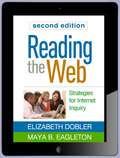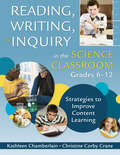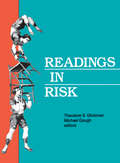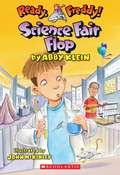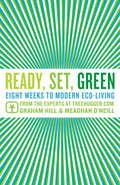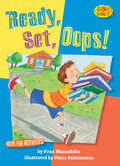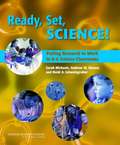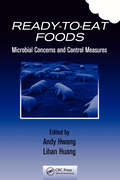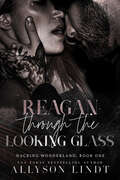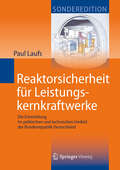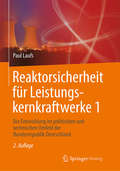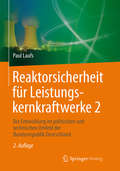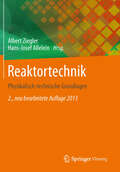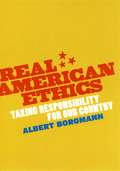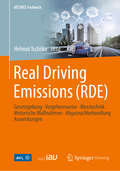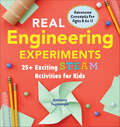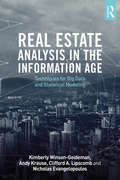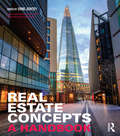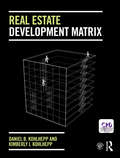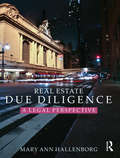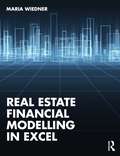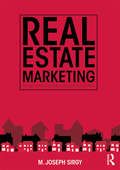- Table View
- List View
Reading the Comments: Likers, Haters, and Manipulators at the Bottom of the Web (The\mit Press Ser.)
by Joseph M. ReagleWhat we can learn about human nature from the informative, manipulative, confusing, and amusing messages at the bottom of the web.Online comment can be informative or misleading, entertaining or maddening. Haters and manipulators often seem to monopolize the conversation. Some comments are off-topic, or even topic-less. In this book, Joseph Reagle urges us to read the comments. Conversations “on the bottom half of the Internet,” he argues, can tell us much about human nature and social behavior.Reagle visits communities of Amazon reviewers, fan fiction authors, online learners, scammers, freethinkers, and mean kids. He shows how comment can inform us (through reviews), improve us (through feedback), manipulate us (through fakery), alienate us (through hate), shape us (through social comparison), and perplex us. He finds pre-Internet historical antecedents of online comment in Michelin stars, professional criticism, and the wisdom of crowds. He discusses the techniques of online fakery (distinguishing makers, fakers, and takers), describes the emotional work of receiving and giving feedback, and examines the culture of trolls and haters, bullying, and misogyny. He considers the way comment—a nonstop stream of social quantification and ranking—affects our self-esteem and well-being. And he examines how comment is puzzling—short and asynchronous, these messages can be slap-dash, confusing, amusing, revealing, and weird, shedding context in their passage through the Internet, prompting readers to comment in turn, “WTF?!?”
Reading the Web, Second Edition
by Maya B. Eagleton Elizabeth Dobler Donald J. LeuToday's students need to know how to locate, comprehend, evaluate, and use online information efficiently and effectively. This widely used teacher guide and course text provides a framework for maximizing students' critical, creative use of the Web in grades 3-8. Research-based strategies for instruction and assessment across the content areas are clearly explained and linked to the Common Core State Standards (CCSS). In a large-size format for easy photocopying, the book is packed with graphics, sidebars, lesson plans, and more than 90 reproducible handouts. Purchasers get access to a Web page where they can download and print the reproducible materials. New to This Edition *Incorporates state-of-the-art research and Web resources. *Chapter on major Web 3.0 developments, such as the rise of social media and mobile devices. *Connections to the CCSS are identified throughout. *Stronger focus on Universal Design for Learning and differentiated instruction. *Larger format facilitates photocopying of the updated reproducible tools.
Reading, Writing, and Inquiry in the Science Classroom, Grades 6-12: Strategies to Improve Content Learning
by Kathleen Chamberlain Christine Corby CraneThis resource covers reading and writing practices, science standards, and sample lessons to help educators successfully integrate literacy and science instruction in any classroom.
Readings in Risk
by Michael Gough Theodore S. GlickmanDeveloped for use as a reference work in graduate and undergraduate courses as well as for researchers, policymakers, and interested laypersons, the book is a unique collection of authoritative yet accessible journal articles about risk. Drawn from a variety of disciplines including the physical and social sciences, engineering, and law, the articles deal with a wide range of public policy, regulatory, management, energy, and environmental issues. The selections are accompanied by introductory notes, questions for thought and discussion, and suggestions for further reading.
Ready, Set, Green
by Graham Hill Meaghan O'NeillThe time to save the planet is now. Ready? Set? Green!Living green means reversing climate change, but it also means protecting your kids and pets, improving your own health, and saving money. And it doesn’t necessarily demand a radical overhaul of your life–just some simple adjustments, such as switching to healthier cleaning products and driving fewer miles each week. Written by the visionaries at Treehugger. com, the most heavily trafficked site of its kind,Ready, Set, Greenis the definitive (and recyclable) guide to modern green living. It offers solutions to make your home, office, car, and vacation more eco-friendly. For example: • Using a dishwasher instead of hand washing will save you 5,000 gallons of water annually. • Eating less beef will save you 250 pounds of CO2 per year. • Washing your clothes in cold water instead of hot will save 200 pounds of CO2 annually. • Replacing three of your home’s most frequently used lightbulbs with compact fluorescent bulbs will save 300 pounds of CO2 every year. Including advice on how to properly insulate your house, cancel junk mail, and choose fruits and veggies wisely,Ready, Set, Greenwill help youchange the future of the planet and restore balance to your daily life. From the Trade Paperback edition.
Ready, Set, Oops! (Science Solves It!)
by Fran ManushkinJoey's running to the library--fast. Too fast! But his trips and tumbles won't help him come up with an idea for Science Day. Or will they?
Ready, Set, SCIENCE!: Putting Research to Work in K-8 Science Classrooms
by National Research Council of the National AcademiesWinner of the Association of Educational Publishers 2008 Distinguished Achievement Award. Filled with classroom case studies, this book demonstrates the most effective methods of helping students achieve science proficiency.
Ready-to-Eat Foods: Microbial Concerns and Control Measures
by Andy Hwang Lihan HuangWith growing consumer demand for ready-to-eat (RTE) foods that are wholesome and require less handling and preparation, the production of RTE foods has increased and their variety has expanded considerably, spanning from bagged spinach to pre-packaged school lunches. But since RTE foods are normally consumed directly without cooking- a step that ki
Reagan Through the Looking Glass (Hacking Wonderland #1)
by Allyson LindtTo most people, Jabberwock is a myth.A horror story that politicians and CEO's tell their interns, about a mysterious figure who pulls the strings of the world's most powerful, from the shadowy corners of the deep web.Reagan knows he's real. Jabberwock is the reason people around her are dying. Two men insist they can keep her safe and help her find answers. Hare is sweet, soft-spoken, and introduces her to a wicked walk on the wild side, spiced with temptation and thrill.Hatter has kept secrets from her since they met. But he speaks her language, and a single touch from him ignites her desire.As she follows the tracks down the rabbit hole, Reagan is dropped headfirst into a world of the dangerous and surreal, where everything and everyone has a price. And her time is running out to discover if it's the Hatter or the Hare who owns Jabberwock's bounty on her.Publisher’s Note: This book was previously released under the same title. It is part one of a duet. It does not stand alone. Book two is The Hatter and The Hare.Other Books By Allyson LindtValkyrie's Legacy Series (Urban Fantasy)Valkyrie RebornValkyrie HuntedValkyrie ConcealedValkyrie CrownedThree Player Co-op (Ménage Romance)Looking For ItWaiting For ItAsking For ItRunning For ItFighting For ItGame for Cookies Series (Ménage Romance)Seduction GamesControl GamesTwo Plus One (Ménage Romance)Their NerdTheir Matchmaker3d20 Series (Ménage Romance)Roll Against TrustRoll Against RegretRoll Against DiscoveryRoll Against BetrayalSubscribe, Live, Love Series (Ménage Romance)Red HuntedRed ConsumedBeauty ClaimedBeauty AwakenedUbiquity Series (Urban Fantasy Reverse Harem)Seductive SoulSoul ReaperSoul BetrayerTruth's Harem Series (Urban Fantasy Reverse Harem)Fate's IllusionInnovation's MuseApathy's HeroRidden Hard (M/F Contemporary Romance)Hard FlipHard PackRiding the WaveDrive Me WildLove Equation (Contemporary Romance)RivalCharmed by the GeeksRegretRestraintLove Games (M/F Contemporary Romance)His ReputationHer AirmanHis CosplayerLove Hack (M/F Contemporary Romance)His HackerHis InfatuationHer SurrenderHacking Wonderland (Suspense)Reagan through the Looking GlassThe Hatter and the HarePainting the Roses RedReigning HeartsNull Equation (Dystopian Romance)Over ExposedOver StimulatedOver SharedStand Alone TitlesSeeking More (M/F New Adult Romance)Destined for Temptation (Paranormal Romance)
Reaktorsicherheit für Leistungskernkraftwerke
by Paul LaufsIn dem Band wird die Entwicklung der Reaktorsicherheit in deutschen Leichtwasser-Kernkraftwerken nachgezeichnet. Dabei wird auf die Rolle internationaler Vorbilder ebenso Bezug genommen wie auf nationale und internationale Risikostudien. Anhand des Beispiels Reaktorsicherheit wird deutlich, unter welchen politischen Bedingungen internationale Großforschungsprojekte entwickelt werden: Sicherheitsreserven und -kultur wurden in dem Moment verbessert, als die Frage der Nutzung der Kernenergie in das Zentrum der politischen Auseinandersetzungen rückte.
Reaktorsicherheit für Leistungskernkraftwerke 1
by Paul LaufsIn dem Band wird die Entwicklung der Reaktorsicherheit in deutschen Leichtwasser-Kernkraftwerken nachgezeichnet. Dabei wird auf die Rolle internationaler Vorbilder ebenso Bezug genommen wie auf nationale und internationale Risikostudien. Anhand des Beispiels Reaktorsicherheit wird deutlich, unter welchen politischen Bedingungen internationale Großforschungsprojekte entwickelt werden: Sicherheitsreserven und -kultur wurden in dem Moment verbessert, als die Frage der Nutzung der Kernenergie in das Zentrum der politischen Auseinandersetzungen rückte.
Reaktorsicherheit für Leistungskernkraftwerke 2
by Paul LaufsDas Werk beschreibt die wesentlichen Tätigkeitsfelder der Entwicklung der Kernenergienutzung im politischen und technischen Umfeld der Bundesrepublik Deutschland. Insbesondere die Entwicklung der Reaktorsicherheit deutscher Leichtwasser-Kernkraftwerke wird aus den Anfängen heraus mit ihren vielfältigen Bezügen zu ausländischen Vorbildern, zu nationalen und internationalen Forschungsvorhaben sowie zu konventionellen und nuklearen Schadensereignissen wiedergegeben.In diesem Band 2 werden die Sicherheitsfragen in Bezug auf die zentrale und wichtigste Komponente eines Kernkraftwerks vertieft, den Reaktordruckbehälter. Den in Deutschland verwendeten Reaktortechnologien werden zukünftige Optionen gegenübergestellt. Die hier vorliegende 2. Auflage enthält Ergänzungen, Korrekturen und neue Abbildungen. Neu bearbeitet wurden das Alterungsmanagement langjährig betriebener Anlagen, der Rückbau und die Entsorgung radioaktiver Abfälle.Detaillierte und reich bebilderte Darstellungen sind Kennzeichen der sachlichen Behandlung des Themas. Den in Band 1 dargestellten spezifischen Sicherheitstechniken, wie die Berstsicherheit der druckführenden Umschließung, die Sicherstellung der Notkühlung, die notwendige Leittechnik und der Umgebungsschutz, werden nun in Band 2 auch die detaillierten Betrachtungen des Alterungsmanagements, des Rückbaus von Kernkraftwerken und der Entsorgung radioaktiver Abfälle hinzugefügt. Die Inhalte schließen auch Ergebnisse nationaler und internationaler Risikostudien ein. Es wird gezeigt, wie die nationalen und internationalen Anstrengungen von Industrie, Staat und Wissenschaft zur Erhöhung der Sicherheitsreserven und zur Verbesserung der Sicherheitskultur in einem gesellschaftlichen Umfeld vorangetrieben wurden, in dem die Frage der Kernenergienutzung zu einem zentralen Thema der politischen Auseinandersetzungen wurde.
Reaktorsicherheit für Leistungskernkraftwerke: Die Entwicklung im politischen und technischen Umfeld der Bundesrepublik Deutschland
by Paul LaufsIn dem Band wird die Entwicklung der Reaktorsicherheit in deutschen Leichtwasser-Kernkraftwerken nachgezeichnet. Dabei wird auf die Rolle internationaler Vorbilder ebenso Bezug genommen wie auf nationale und internationale Risikostudien. Anhand des Beispiels Reaktorsicherheit wird deutlich, unter welchen politischen Bedingungen internationale Großforschungsprojekte entwickelt werden: Sicherheitsreserven und -kultur wurden in dem Moment verbessert, als die Frage der Nutzung der Kernenergie in das Zentrum der politischen Auseinandersetzungen rückte.
Reaktortechnik: Physikalisch-technische Grundlagen
by Albert Ziegler Hans-Josef AlleleinIm Buch Reaktortechnik werden die physikalisch-technischen Grundlagen und deren konkrete Umsetzung in Kraftwerken beschrieben. Nach der Darstellung der kernphysikalischen und thermohydraulischen Grundlagen beschreiben die Autoren Grundprinzipien und Aufbau bewährter Reaktorkonzepte ebenso wie die neuen Entwicklungen. Einen weiteren Schwerpunkt bilden Betrieb, Werkstoff- und Zuverlässigkeitsfragen. Abschließend gehen die Autoren auf den Brennstoffkreislauf vom Uranabbau bis zur Entsorgung ein. Motivation der Herausgeber war, den heutigen Stand des Wissens der Reaktortechnik zusammenzutragen und Ingenieuren in Studium und Praxis zugänglich zu machen. Das Buch basiert auf dem von Albert Ziegler herausgegebenen Standardwerk der Reaktortechnik. Das Buch eignet sich nicht nur als Lehrbuch für Studierende, sondern auch als Nachschlagewerk für die berufliche Praxis.
Real American Ethics: Taking Responsibility for Our Country
by Albert BorgmannAmerica is a wonderful and magnificent country that affords its citizens the broadest freedoms and the greatest prosperity in the world. But it also has its share of warts. It is embroiled in a war that many of its citizens consider unjust and even illegal. It continues to ravage the natural environment and ignore poverty both at home and abroad, and its culture is increasingly driven by materialism and consumerism. But America, for better or for worse, is still a nation that we have built. So why then, asks Albert Borgmann in this most timely and urgent work, are we failing to take responsibility for it? In Real American Ethics, Borgmann asks us to reevaluate our role in the making of American values. Taking his cue from Winston Churchill—who once observed that we shape our buildings, and then our buildings shape us—Borgmann considers the power of our most enduring institutions and the condition of our present moral makeup to propose inspired new ways in which we, as ordinary citizens, can act to improve our country. This, he shows, includes everything from where we choose to live and what we spend our money on to daunting tasks like the reshaping of our cities—habits and actions that can guide us to more accomplished and virtuous lives. Using prose that is easy and direct throughout, Borgmann’s position is grounded neither by conservative nor liberal ideology, but in his understanding that he is a devoted citizen among many. In an age in which the blame game is the only game in town, this patriotic book is an eloquent reminder of the political strength we all wield when we work together.
Real American Ethics: Taking Responsibility for Our Country
by Albert BorgmannAmerica is a wonderful and magnificent country that affords its citizens the broadest freedoms and the greatest prosperity in the world. But it also has its share of warts. It is embroiled in a war that many of its citizens consider unjust and even illegal. It continues to ravage the natural environment and ignore poverty both at home and abroad, and its culture is increasingly driven by materialism and consumerism. But America, for better or for worse, is still a nation that we have built. So why then, asks Albert Borgmann in this most timely and urgent work, are we failing to take responsibility for it? In Real American Ethics, Borgmann asks us to reevaluate our role in the making of American values. Taking his cue from Winston Churchill—who once observed that we shape our buildings, and then our buildings shape us—Borgmann considers the power of our most enduring institutions and the condition of our present moral makeup to propose inspired new ways in which we, as ordinary citizens, can act to improve our country. This, he shows, includes everything from where we choose to live and what we spend our money on to daunting tasks like the reshaping of our cities—habits and actions that can guide us to more accomplished and virtuous lives. Using prose that is easy and direct throughout, Borgmann’s position is grounded neither by conservative nor liberal ideology, but in his understanding that he is a devoted citizen among many. In an age in which the blame game is the only game in town, this patriotic book is an eloquent reminder of the political strength we all wield when we work together.
Real Driving Emissions: Gesetzgebung, Vorgehensweise, Messtechnik, Motorische Maßnahmen, Abgasnachbehandlung, Auswirkungen (ATZ/MTZ-Fachbuch)
by Helmut Tschöke Michael Arndt Michael Baade René Berndt Frank Bunar Boris Bunel Gernot Graf Markus Grubmüller Helmut Jansen Dieter Köhler Elisa-Maria Moser Lukas Walter Roland Wanker Friedemann Schrade Khai VidmarDas Buch beschreibt die Entwicklung der Abgas-Gesetzgebung und der Fahrzyklen, auch für die Verbrauchsmessung (CO2). Schwerpunkte sind die RDE-Gesetzgebung und die Vorgehensweise bei der Straßenmessung inklusive der dafür notwendigen mobilen Messtechnik (PEMS). Die komplizierte Bewertung der Messergebnisse wird verständlich dargestellt. Auch wenn der Pkw (Diesel und Benzin) im Vordergrund steht wird auch die praxisnahe Feldüberwachung (In Service Conformity) für Nutzfahrzeuge betrachtet. Mit der detaillierten Beschreibung von innermotorischen Maßnahmen und der Abgasnachbehandlung zur Reduzierung der Schadstoffemissionen erhält der Leser einen kompakten Überblick über die neueste Abgasgesetzgebung und die Reduzierung der Abgasschadstoffe für Fahrzeuge mit Verbrennungsmotoren. Am 3. Februar 2016 hat das Europäische Parlament das Gesetz zur Messung von Abgasschadstoffen unter realen Bedingungen auf der Straße beschlossen. Dieser sogenannte Real Driving Emissions Test (RDE) ist seit 1. September 2017 für die Messung der Stickoxide, der Partikelanzahl, der Kaltstartemissionen und der Emissionen von Hybridfahrzeugen für neue Fahrzeugmodelle Pflicht. Gleichzeitig wurde der praxisnähere Test-Zyklus WLTC anstelle des NEFZ eingeführt. Ein Jahr später gilt das Verfahren für alle neuen Fahrzeuge. Hintergrund der Messung unter realitätsnahen Bedingungen ist die zunehmende Diskrepanz zwischen den unter synthetischen Bedingungen (z.B. Fahrzyklus NEFZ) ermittelten geringen Emissionen und der nach wie vor unbefriedigenden Luftqualität (Immission), besonders in Regionen mit hoher Verkehrsdichte.
Real Engineering Experiments: 25+ Exciting STEAM Activities for Kids (Real Science)
by Anthony TegtmeyerSTEAM-powered experiments in engineering for kids ages 8 to 12Learn about the amazing world of engineering for kids and how it works together with science, technology, art, and math. Whether you're experimenting with structures, materials, mechanics, or electrons, this book offers step-by-step instructions and full-color pictures that help you answer questions like "what can we use magnetism for?" and "how do catapults work?"This guide to engineering for kids features:Engineering explained—Dive deep into what it means to be an engineer as you learn about the different types of engineers and how they approach challenges.Amazing experiments—Build a robot, make your own battery, clean polluted water, create a wind-powered car, and more using basic items you might already have at home.Beginner guidance—Find explanations for why each experiment works, as well as suggestions for taking them even further.Explore the amazing world of engineering for kids with these fun experiments that will get kids excited about learning.
Real Estate Analysis in the Information Age: Techniques for Big Data and Statistical Modeling
by Clifford A. Lipscomb Kimberly Winson-Geideman Andy Krause Nick EvangelopoulosThe creation, accumulation, and use of copious amounts of data are driving rapid change across a wide variety of industries and academic disciplines. This ‘Big Data’ phenomenon is the result of recent developments in computational technology and improved data gathering techniques that have led to substantial innovation in the collection, storage, management, and analysis of data. Real Estate Analysis in the Information Age: Techniques for Big Data and Statistical Modeling focuses on the real estate discipline, guiding researchers and practitioners alike on the use of data-centric methods and analysis from applied and theoretical perspectives. In it, the authors detail the integration of Big Data into conventional real estate research and analysis. The book is process-oriented, not only describing Big Data and associated methods, but also showing the reader how to use these methods through case studies supported by supplemental online material. The running theme is the construction of efficient, transparent, and reproducible research through the systematic organization and application of data, both traditional and 'big'. The final chapters investigate legal issues, particularly related to those data that are publicly available, and conclude by speculating on the future of Big Data in real estate.
Real Estate Concepts: A Handbook
by Ernie JowseyThe essential reference tool for all real estate, property, planning and construction students. Real Estate Concepts provides built environment students with an easy to use guide to the essential concepts they need to understand in order to succeed in their university courses and future professional careers. Key concepts are arranged, defined and explained by experts in the field to provide the student with a quick and reliable reference throughout their university studies. The subjects are conveniently divided to reflect the key modules studied in most property, real estate, planning and construction courses. Subject areas covered include: Planning Building surveying Valuation Law Economics, investment and finance Quantity surveying Construction and regeneration Sustainability Property management Over the 18 alphabetically arranged subject specific chapters, the expert contributors explain and illustrate more than 250 fully cross-referenced concepts. The book is packed full of relevant examples and illustrations and after each concept further reading is suggested to encourage a deeper understanding. This book is an ideal reference when writing essays, assignments and revising for exams.
Real Estate Development Matrix: A Handbook
by Daniel B Kohlhepp Kimberly J. KohlheppThis book presents a new way of thinking about, teaching, learning, and practicing real estate development. Real Estate Development Matrix describes the process in a two-dimensional model and presents seven Development Stages which form the horizontal axis, and eight sets of Development Tasks which form the vertical axis to define a 56-cell matrix. In each cell, money is spent and risks are taken to achieve certain tasks and thereby create (or destroy) value. This holistic process considers the entire life cycle of real estate from its "green field" inception to its "brown field" state. The book is written by a real estate developer and academic, and the presented material is conceptual, practical, and non-technical. Jargon has been minimized as much as possible as the author introduces an entirely new model for real estate development that is both academically authoritative and developed in practice. It is aimed at a general professional audience participating in the development process, but equally the book is ideal for use as a textbook in undergraduate and graduate courses in real estate development, and an excellent supplemental text for business courses discussing real estate finance and investment. It may also be used as a textbook for professional courses, workshops, or seminars in real estate development. The book is supported by an interactive website at http://realestatedevelopmentmatrix.com/
Real Estate Due Diligence: A legal perspective
by Mary Ann HallenborgReal Estate Due Diligence is the first textbook on due diligence, the cornerstone of every successful real estate deal. Due diligence is designed to uncover potential risks posed by a real estate acquisition, financing, or development project and failure to carry it out successfully can result in costly oversights and diminished investment returns. This book demonstrates how to assess and manage legal risks on properties such as office buildings, shopping centres, industrial buildings, apartments, and hotels—before the transaction closes. Real estate students and practitioners are taken through all of the essential due diligence areas, including: Titles and ownership issues Zoning and land use Liens and mortgages Condition assessments Environmental and operational concerns And lease analysis Throughout the book, major laws and court cases are used to illustrate due diligence issues and provide rich opportunities for classroom study and discussion. Practice points and comprehensive due diligence checklists help readers to go on to put their learning in practice. This book fills a gap in the real estate literature and is perfect for use as a college textbook, a practitioner’s guide, or for industry training.
Real Estate Financial Modelling in Excel
by Maria WiednerGet ahead of your peers with Real Estate Financial Modelling in Excel, a book specifically designed to ensure that the next generation of property professionals become experts in the quantitative analysis of investments by teaching them how to create automated spreadsheets for the analysis of risk and return.Real estate financial modelling has become an essential skill to investment analysts as the global property industry has seen huge transformations as a result of more institutional investors, especially private equity funds, increasing their interest in the asset class. Consequently, the industry requires a new skill set from real estate professionals and graduates.Real Estate Financial Modelling in Excel will help current finance and real estate students, as well as practitioners, to harness the power of Microsoft Excel in the context of real estate investments and explain in an easy-to-follow manual style how to create financial models that will predict financial returns and the risks related to them. Readers will learn to use Excel for automation, data analysis, and data visualisation to inform their capital allocation decisions, giving them the edge with those technical skills in high demand in the investment markets and in particular with sophisticated investors such as pension and insurance funds, private equity, and specialised debt funds.This book will address the needs of busy real estate professionals and students in the final year of a real estate bachelor’s degree or master’s degree, who want to apply the theories of finance and investment into practice and build models to help make decisions regarding acquisitions, disposals, and management of real estate assets.
Real Estate Marketing: Strategy, Personal Selling, Negotiation, Management, and Ethics
by M. Joseph SirgyReal Estate Marketing is specifically designed to educate real estate students with the art and science of the real estate marketing profession. The ideal textbook for undergraduate and graduate level classes in business school and professional / continuing education programs in Real Estate, this book will also be of interest to professional real estate entrepreneurs looking to boost their knowledge and improve their marketing techniques. The book is divided into five major parts. Part 1 focuses on introducing students to fundamental concepts of marketing as a business philosophy and strategy. Concepts discussed include strategic analysis, target marketing, and the four elements of the marketing mix: property planning, site selection, pricing of properties, and promotion of properties. Part 2 focuses on personal selling in real estate. Students will learn the exact process and steps involved in representing real estate buyers and sellers. Part 3 focuses on negotiations in real estate. How do effective real estate professionals use negotiation approaches such as collaboration, competition, accommodation, and compromise as a direct function of the situation and personalities involved in either buying or selling real estate properties? Part 4 focuses on human resource management issues such as recruiting and training real estate agents, issues related to performance evaluation, motivation, and compensation, as well as issues related to leadership. Finally, Part 5 focuses on legal and ethical issues in the real estate industry. Students will learn how to address difficult situations and legal/ethical dilemmas by understanding and applying a variety of legal/ethical tests. Students will also become intimately familiar with the industry’s code of ethics.

